ECONOMIC JUSTICE/FINANCIAL LITERACY SUNDAY
CULTURAL RESOURCES
Sunday, January 27, 2013
Brian Bantum, Lectionary Team Cultural Resource Commentator
I. Historical Document
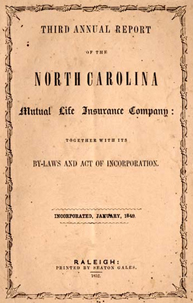
In 1940, North Carolina Mutual celebrated its golden anniversary. The first African American-owned insurance company was founded to alleviate the burden of sudden financial disasters such as death or accidents. But North Carolina Mutual was intentional in utilizing the money it collected to build up the African American community. By doing so, North Carolina Mutual was an example of how intentional collective action can participate in the creation of a mutually thriving community.
The following video is a clip from North Carolina Mutual’s 50th anniversary celebration.
II. History
The story of the African in America is, in many ways, a story of economics. The presence of slaves in the New World was an economic venture where their bodies were seen solely as an economic resource to be used and exploited. Emancipation in 1865 brought freedom in a legal sense, but the black codes of the post-Reconstruction era and Jim Crow of the 20th century continued to subject African Americans to the whims of those who owned land and businesses, leveling resources and business practices against African Americans to prevent their success.
But in the midst of these profound challenges, African Americans, oftentimes through the collective will and imagination of the church, garnered resources in order to start businesses and schools. While seemingly small moments in the context of the powerful economic and social forces, many African Americans started businesses and pursued an education. These acts were significant acts of resistance to the prevailing system of degradation and economic manipulation. These were acts of resistance because they sought to shift the center of power away from white landowners and business owners who used their power to perpetually exploit African Americans, keeping them in poverty, living month to month, paycheck to paycheck, and consequently keeping the owners in perpetual power.
By shifting the center of power through education and/or entrepreneurship, African Americans were able to dictate the terms of their economic lives and thus garner their resources towards building up their families and their communities.
One of the earliest African American banks, Capital Bank in Washington, D.C., was formed through the support of African American churches, and through this support the bank was able to provide loans and financial support to African American businesses that white banks refused to support. This bank, along with insurance companies, funeral homes, and other businesses that sought to take care of African American families, were formed to help protect and consolidate the economic resources of the black community. Throughout its history the African American church was the center of these movements.1
III. Stories
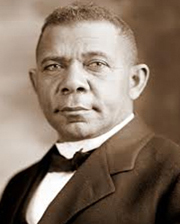 |
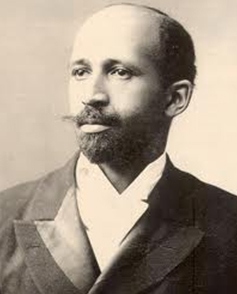 |
| Booker T. Washington |
W.E.B. Du Bois |
In the early 1900s, Booker T. Washington and W.E.B. Du Bois engaged in an ongoing debate on the “uplift of the race.” According to Washington, the way to confront oppressive conditions was to master everyday skills such as farming or carpentry, initiate their own businesses, and create their own means of support through communities that were independent of white landowners and business owners. On the other hand, Du Bois advocated the necessity of education that would lead to increasing literacy rates and entrance into middle- and upper-class professions such as law, medicine, and education. But in order to do so African Americans must also confront racist policies that prevented African Americans from entering into these professional spheres.
Both Washington and Du Bois were focused on how to best utilize the resources of the community. While the focus of both men was different, taken together Washington and Du Bois highlight how concerns for financial stewardship (how we use what we have) is tied to questions of economic injustice (how others manipulate resources to the detriment of others). By consolidating resources whether through banks, through work-training programs, or through education, African American communities were able to resist the oppressive practices of businesses that sought to exploit their labor and resources.
In our current moment we see exploitive financial policies such as disproportionately high interest rates on credit cards, discriminatory lending practices for home mortgages, and predatory lending having a significant impact on the ability of African Americans (and Latinos) to gather enough resources to stabilize their personal lives and their communities.
In confronting these issues, personal financial stewardship is a key skill to help resist exploitive financial practices. But, in addition to personal responsibility, African American communities do have collective power. The power of the community can create a significant impact in much the same way that the earliest African American banks served to consolidate African American resources and provide a solid footing to resist the exploitive practices of the dominant banks.
In these ways, economic justice and financial stewardship are tied together and can become powerful ways to follow Christ and make Christ known in one’s community.
IV. Meaningful Learning Moments
Finances are a reality that permeate every aspect of a church’s life because they are present in virtually every moment of a congregant’s life. Whether enjoying a meal after church on Sunday or trying to figure out how to pay for college, economic questions are questions of our daily life and our daily walk as disciples.
But individual economic realities are also communal economic realities. The temptation to get a high interest credit card, the lack of viable work opportunities in the neighborhood, the lack of access to affordable healthcare, and the difficulty in getting a good rate on a mortgage are all tied to the overall economic health of a community. Because of this, financial literacy is not only a question of managing one’s finances but also resisting the “powers” that seek to manipulate and exploit. Understanding budgets and interest rates and managing and consolidating one’s wealth is an opportunity to create spaces of freedom where families can begin to imagine their possibilities and calling. But in order to create these spaces, not only is individual knowledge important, but also an understanding of how the economic system works is crucial.
Predatory lending practices, under-funding of educational opportunities, and when businesses are encouraged or discouraged to hire are all issues of a wider economic system that perpetuates inequalities in our society. These issues cannot be addressed solely through individuals doing a better job of saving and intelligently spending their money. Here churches can begin to reclaim the legacy of collective advocacy, consolidating resources, and creating communal spaces where individual and communal thriving are bound together.
To help congregations think through the connection between the individual and communal aspects of economic justice and financial literacy congregations could:
- Identify one or two congregants to share how they were able to get out of debt.
- Identify and lift in prayer a local business, school, or organization that needs the support of the church. Follow-up with a plan to partner with the school, business, or organization to pool resources.
- Highlight a testimony of mutual support where finances were consolidated to mutually benefit people in the community.
V. Seven Words That Will Close the Black Wealth Gap
1. God.
For those of us who believe that one’s relationship with God permeates all areas of his or her life, placing God at the center of the discussion is a necessity as we seek to close the black wealth gap. This philosophy has little to do with the concept with which all pastors are familiar—tithing. Instead, it has everything to do with the notion that we are stewards of everything that God has given us. The New Testament word for stewardship is oikonomia, from which we derive the word economy. This word means “management of a household,” and it refers to the responsibility that is entrusted to a manager. A steward acts as an administrator of the affairs and possessions of another. A steward is fully accountable to his or her master and may act justly, as did Joseph who became Potiphar’s steward (Genesis 39:4-6), or unjustly, as did the steward who squandered his master’s possessions (Luke 16:1-13).
God is our Master, and we are responsible to manage God’s affairs and possessions. Because we are God’s servants, all that we have is God’s. This explodes the popular misconception that we give God a percentage (the tithe) and the rest is ours. According to Scripture, we are accountable to God for everything. Whether we have much or little, our key responsibility as stewards remains the same: faithfulness. “Let a man regard us in this manner, as servants of Christ, and stewards of the mysteries of God. In this case, moreover, it is required of stewards that one be found trustworthy” (1 Corinthians 4:1-2).
The Lifestyle of Stewardship
If biblical stewardship involves every facet of life, it requires a basic commitment on our part: we must present ourselves to God as servants, with no conditions attached. The real issue of stewardship is whether we are administrating our affairs and possessions as though they are ours or as though they are God’s. The pattern of our lives is shaped by the decisions we make, and the greatest of these decisions is this: Am I the lord of my life, or is God the Lord of my life? We will either seek to rule our own lives (the tragedy of the first Adam) or submit to the rule of God (the triumph of the second Adam) which is Christ. For African Americans, claiming a lifestyle of stewardship requires that we live, spend our money, save our money, invest our money, and give our money away according to God’s dictates. This requires constant inventory of all that we have so that we can discern our points of ungodly excess, our points of selflessness, and our points of foolishness/ignorance.
2. Village-Focus.
Most African American adults over sixty-five can remember being reared in some semblance of a village. They were cared for by people to whom they were not related by blood. They were disciplined by people to whom they were not related by blood. They were prayed for and sent soaring to higher heights by church members, neighbors, and folk who just wanted them to succeed. No one was homeless. No one was hungry although few were financially rich. In the village, the focus was God, education, and family. Yes, there were families that were dysfunctional. Yes there were alcoholics, incest, and child abuse. But because one was part of a village, you stood a chance of surviving all of the horrors that life could visit on you if you were black and poor.
Everyone can now tell you that much has changed. There is no longer a village-focus when it comes to securing the well-being of families, especially children. Now, too many of us do not even know our neighbors even if they live right next door. We do not check in on seniors on our blocks because we do not know who lives on our block. We do not discipline children who live in our neighborhood because we do not know them or their parents, because we are afraid of them, or both.
A Story from the Village—By Martha Simmons, Creator of The African American Lectionary
“I live in a gated community in downtown Atlanta. Four doors over lived two young males whom I got to know. Both were doing well in their careers and living the life. One of the two had a younger half-brother whom he would often visit in Louisiana. He told me the following story: “I went home to visit and found that he had dyed his hair two different colors, that his grades were slipping, and that he had started to hang out with the wrong crowd. His mother and I agreed that I would bring him to Atlanta to live with me until he finished high school and entered college.” I thought that this was very commendable that a half-brother would take on such a large responsibility. So, I offered to help in any way that I could. But this young man really became my “Village Man of the Year” when he also took in a young man who was a football teammate of his younger half-brother. The football teammate, although not a troubled kid, was being reared by a mother who had him when she was just a teen. She asked him to leave the house because, as she said by phone, “He eats too much and costs too much not to be working. Instead of playing sports, he needs to get a job.” This idea had been introduced to her by her boyfriend and she totally agreed.
Because I knew that this would be too much for one young adult to handle, it was time for me to act like the elder in the village. So, I made a deal with the brother who had taken in both boys. I would assist with the financial, educational, emotional, and medical needs of the boy whose mother had kicked him out. No, I didn’t have any extra income lying around to dress a size-large clothes, size-12-shoes teenager. No, I didn’t have extra time to check a child’s homework, hire tutors, check to see who he was dating, and go to his football and basketball games (he plays both sports). No, I didn’t have the emotional energy to begin to undo the trauma of being put out of your home because you chose school over a job while in high school. But for every No I had in my head, I could hear the voices of the ancestors speaking an even louder Yes! That is the village way. My commitment is to the village.”
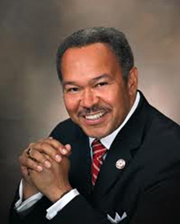 |
Dr. Robert Franklin, in his book Crisis in the Village, talks about the family, church, and education/schools as the three pillars of the Black Community. The crisis faced by the family, according to Franklin, is a “crisis of commitment.” We agree. However, let it also be said that what is needed is not just a commitment by blood-family members, but by the entire village! The Black Community is falling apart because we no longer have a village-focus. Without such a focus, we will continue to be poorer and weakened. Reverend Simmons chose to expend part of her income on a struggling child. What will you choose to expend your income on that helps the village? |
3. Education.
Every church, big or small, should have an education czar who heads an education committee. Education is a series of building blocks that when stacked properly leads to educated citizens. For too many black children, especially boys, the blocks are toppled by the time they reach the fourth grade. For many of these children, their future incomes are determined at the same age as the triple terrors of inadequate education, poverty, and race combine to send their futures headfirst into the whirlwind of unemployment or underemployment.
Black kids start at a disadvantage if they begin in segregated, poor schools and are poor financially as well. Here’s where the Church can make a major difference. Along with advocating for stronger and wealthier schools for children who attend their churches and or live in their neighborhoods, every black church can get involved in more personal ways. Since we all know that the less educated that a child is the more likely he or she is to end up poor, in prison, and unhealthy, by ensuring that every church has an education czar, each church can be the change it seeks in education. The job of the education czar and those who will work with the czar will be at least three-fold:
1. To ensure that every child in his or her church that is of preschool age is in preschool. Everyone knows what a great difference is made in the educational life of children who begin learning as early as possible. This effort will require that education committees find financial help and government support where necessary for those who cannot afford preschool.
2. The committee must develop a file on every child in its church that includes all data that can be gained through schools (with the assistance of parents or guardians) including whether the child has learning disabilities that are not being addressed, the grade and math level at which a child is performing, and a clear understanding of the amount of educational support a child has at home.
3. The committee’s ultimate goal is to make sure that every child reaches grade 12 intellectually, financially, and emotionally ready to attend college or junior college. Even if a child wants to be a beautician, plumber, carpenter, or electrician, they still need at least an Associate Degree to climb to the top in these fields. The higher-education exposure alone will prove invaluable. This requires a longterm commitment by every church including a commitment to strengthening the families of those children who are facing academic difficulty.
Although this may sound difficult, there are numerous models available to help children learn and reach their highest potential. Places to begin your research include:
 |
Bochner, Arthur and Rose Bochner. The New Totally Awesome Money Book for Kids. New York, NY: William Morrow, 2007. |
|
|
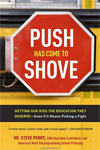 |
Perry, Steve. Push Has Come to Shove: Getting Our Kids the Education They Deserve—Even If It Means Picking a Fight. New York, NY: Broadway, 2012. |
|
|
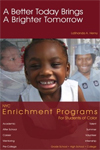 |
Henry, LaShanda A Better Today Brings a Brighter Tomorrow. Lulu.com, 2005. |
- The Congressional Black Caucus Foundation. The Breaking Barriers Report: Plotting Success for School-Age African-American Males. Online location: http://www.cbcfinc.org/
- The Annie E. Casey Foundation. Learning to Read: Early Warning Why Reading by the End of Third Grade Matters. Online location: http://www.aecf.org/
The pay-off will be children who are stronger financially throughout their lives and whose families will also be financially stronger. These children will be more financially literate simply because of their exposure to the building blocks that produce financial strength and financial literacy. Financial injustice is dealt a healthy blow by every black child who understands how their own financial well-being contributes to the financial well-being of their family, their community, and their church.
4. Ownership.
Perhaps more than any one thing other than inadequate education, the fact that so few African Americans own anything of value (including a vehicle that is paid off) is a primary reason that blacks lack financial strength and savings. We are all aware of the injustices that historically have prevented African Americans from owning homes and businesses. We also know that redlining (preventing blacks from buying homes in certain neighborhoods by charging high interest rates) continues. In July 2012 Wells Fargo settled a lawsuit filed by the Justice Department for having steered more than 30,000 minority borrowers into either costlier subprime mortgages and/or higher fees and rates to get homes. Charles Savage of the New York Times reported:
An investigation by the department’s civil rights division found that mortgage brokers working with Wells Fargo had charged higher fees and rates to more than 30,000 minority borrowers across the country than they had to white borrowers who posed the same credit risk, according to a complaint filed on Thursday along with the proposed settlement.
Wells Fargo brokers also steered more than 4,000 minority borrowers into costlier subprime mortgages when white borrowers with similar credit risk profiles had received regular loans, a Justice Department complaint found. The deal covers the subprime bubble years of 2004 to 2009.
Thomas Perez, the assistant attorney general for the civil rights division, said the practices amounted to a “racial surtax,” adding: “All too frequently, Wells Fargo’s African-American and Latino borrowers had no idea they could have gotten a better deal—no idea that white borrowers with similar credit would pay less.”
Wells Fargo admitted no wrongdoing as part of the settlement. In a statement the bank also announced that it would no longer finance mortgages through independent brokers, and noted that it had ceased making subprime loans in 2008….
In December, the division settled a similar lawsuit with Bank of America for $335 million over loan discrimination by its Countrywide Financial unit. In May, SunTrust Mortgage agreed to pay $21 million in a similar case.2
Black businesses seeking loans endure similar treatment cloaked differently. In a 2012 article titled “Black Business Lending: Harder Hit, Less Rebound” in the Washington Business Journal, senior staff writer Jonathan Swtizsky writes:
…Using SBA data obtained through a Freedom of Information Act request, the Washington Business Journal found that the black businesses community has suffered a reversal of fortune over the past few years. It faced a more severe downturn than other groups did, and its recovery has been more elusive.
Among the findings:
- Nearly 44 percent of the 2,408 SBA loans disbursed to local black-owned businesses between 2003 and 2008 have defaulted, meaning they’ve either been written off as a loss or are in liquidation. The default rate for nonblack borrowers in that time was 25 percent.
- The number of SBA loans made to black-owned businesses in fiscal 2011 was down 87 percent from 2007. The dollar amount lent to blacks plunged 71 percent, even as lending to other major ethnic groups was beginning to rebound. Blacks now get a smaller slice of local loans than Hispanics do, even though blacks outnumber them locally almost 2-to-1.
It’s disheartening news for some African-American business leaders encouraged by the surge from 2003 to 2008….
Set up to fail?
There is a common perception among black businesses that SBA loans provide them with just enough money to fail. A 2010 SBA inspector general’s report about Community Express found that the program’s most active lenders disregarded borrowers’ business plans, which include a financial analysis on how the company would use the loan.
“In lieu of analyzing the business plans, lenders assigned credit scores to loans based primarily on factors relating to the business principal’s personal creditworthiness. The higher the numeric score, the larger the loan amount the borrower could receive,” the report read.
The result: Lenders gave borrowers 20 to 80 percent less money than they requested in their business plans, which often made it impossible for the entrepreneurs to execute their plans without seeking additional capital, the report said. This often led the borrowers to default, which hurt their ability to obtain other credit.
Since 2000, 77 percent of all Community Express loans made locally have gone to African-American businesses, and 43 percent of all loans made to blacks locally were Community Express loans.
While the names of the lenders were redacted, the report mentioned that regulators hit one of the two most active Community Express lenders with three enforcement actions beginning in 2007 before seizing it in April 2010.
Lenders also had financial incentives to keep loan amounts low, the report said, including the ability to secure a larger 85 percent guarantee on loans of less than $150,000 and charge significantly higher interest rates for loans under $25,000, which make up the bulk of Community Express loans.
Banks, including Innovative, often sold the guaranteed portion of these loans on the secondary market for a premium of about 11 percent, according to current market rates, which are similar to what they were before the recession. This would effectively allow banks to profit off these loans even if a borrower defaults.
For example, if a bank makes a $10,000 Community Express loan, $8,500 of it is guaranteed by the SBA. That leaves the bank with $1,500 in potential losses. But after charging a loan packaging fee of $950 and selling the guaranteed portion of the loan for a $935 premium (which is 11 percent of $8,500), the bank has already brought in $1,885 on the loan — $385 more than its potential losses — before the borrower even makes the first payment. If an entrepreneur defaults almost right away, the bank still makes money.
Similar incentives hold true for most small-dollar working capital SBA loan programs, not just Community Express. However, most small-dollar loans are made through the SBA Express program, which only carries a 50 percent guarantee and is less susceptible to abuses, said Jeanne Hulit, associate administrator for capital access for the SBA.
She also argues that the decline in lending to blacks, which is playing out nationally, is not necessarily race based. Rather, it’s the small-dollar loans that have taken a major hit during the downturn as banks favor larger loans, which are more profitable, especially when factoring in the expense of the more extensive underwriting banks now do. Because blacks relied disproportionately on small-dollar loans, they were hit hardest by the decline.
Hulit said the SBA does not bear any responsibility for the abuses that happened under Community Express, which remained a pilot program for 12 years until it was scrapped in April 2011….
Small Loan Advantage has received very little interest from lenders and is being revamped to make it easier for banks to use, Hulit said. The Community Loan Advantage program is gathering interest from community organizations, but the process is slow. Since these initiatives were rolled out a year ago, just one loan for $200,000 had been made locally by Sept. 30, the end of fiscal 2011, SBA data show. The ethnicity of that borrower couldn’t be determined. 3
In spite of these obstacles, many continue to buck the trend and find ways to become owners of homes and businesses. How can we enhance this and increase economic justice for blacks and increase their financial literacy at the same time? In terms of business practices, the following ideas are offered, and in an effort to lessen discriminatory practices against black homeowners and business owners, also see the recommendations offered under Government Intervention.
Business Ownership
Although there are many views on how to succeed as a business owner, as shown in the excellent list of books below, the following are the basics. The terminology may differ depending upon the nature of the business, but the basics are the basics.
1. Although everyone knows this, too many still do not do it even when there are free resources to help do it—create a realistic business plan that contains a detailed, realistic, three-year budget. Then, double the budget amount you initially determined and that is likely what you will need to survive.
2. Approach owning a business with an entrepreneurial mind. Too many African Americans open a business to make money. Instead, open a business to make money as a business owner.
3. Be a risk taker but know your area of business well. In order to succeed in business you must be a risk taker. However, entering business without knowing your area of business well is not risking taking—it’s setting yourself up for failure. No matter how well you cook, that does not mean that you can operate a restaurant. Being a business owner is difficult. Make it easier by knowing what it takes to succeed in the area of business in which you are interested. Talk to, work with, and, or for others who have succeeded in your field. Find out their mistakes. Also, read, read, read. There are numerous lessons that can be learned from successful entrepreneurs in your field and/or a related field, and many have written about their experiences. Many also are likely approachable. Contact them, and most will share information with you.
4. Align yourself with others who are like-minded. This means join business clubs, associations, etc., and/or create an organization of like-minded business owners.
5. Develop excellent systems that if consistently adhered to will allow you to offer consistently excellent service. You may want to hire a family member but you cannot do so if they lack the skill-set and training to help you consistently offer excellent service.
6. Determine what suppliers you need to know, how they operate, and what intervention assistance you need and then forge the right relationships.
7. Operate as if you do not have a safety-net. While many business owners begin their businesses while still working a job, to succeed in business, at some point you will have to go all in. So, do not put in what you cannot afford to lose. Also, do not be afraid to fail and start again. Billionaire Ross Perot declared bankruptcy twice before succeeding in business.
8. Gain broad exposure and ensure that you have a strong identity/purpose. This is the new way of saying “find a need and really fill it” and make sure people know you exist. The web and the wave of new technology has made the latter easier than ever. Make sure that you are not a technology dinosaur. If this is not your area of expertise, there are numerous FREE ways to get help. Go to the web and see.
9. Synergize to make a large-scale impact. You can start small but never think small. Always plan with the future in mind. Plan to grow and expand in a city, in a state, across the country, and around the world.
10. Be loyal to your customers and give back. This covers every aspect of how you do business—providing a quality product, having a fair return policy, providing discounts, giving good customer service, and giving back whenever you can in every way that you can.
Home Ownership
To simplify this, we have provided information for the leading groups that assist African Americans in becoming homeowners. No matter where you live in America, including rural America, you DO NOT have to PAY to prepare to become a homeowner. There are numerous programs that will assist you FOR FREE with everything from repairing your credit, learning how to save, gaining a fair home-loan rate, and learning what fees you should and should not pay when purchasing a home.
1. Federal Housing and Urban Development Program (HUD):
http://portal.hud.gov/hudportal/HUD?src=/topics/buying_a_home
2. Federal Government Program on Obtaining a Mortgage:
http://www.usa.gov/shopping/realestate/mortgages/mortgages.shtml
3. Federal Homebuyer Program for persons living in rural areas:
http://www.rurdev.usda.gov/hsf_sfh.html rural areas
4. National Non-Profit group that works to help people become homeowners:
http://www.operationhope.org/home-buyers
5. Legacy-building.
Myriad injustices have prevented blacks from being able to pass down homes, businesses, and stock portfolios to their children. However, this need not continue. Legacy-building involves—more than almost anything—planning. Such planning begins once individuals decide that they want to have children and/or want to leave a substantial financial legacy to an organization (school, church, or other entity).
Legacy-building for Children
It is now difficult for parents to send children to college. Unfortunately, these parents did not begin saving early for their children to go to college. This is doable if parents decide to do it. Here are three ways: a 529 college-savings plan, a Coverdell Education Savings Account, or a term policy. Instead of having family and friends load up children with stuffed animals and other toys, ask them to give a $10.00 or more contribution to your child’s 529 Plan or Coverdell Education Savings Account. Also, do not waste money on wasteful programs such as the Gerber Life Program. These programs offer low, low,
returns. Having a child exit college without huge debt frees them to begin their adult economic journey with a clean slate.
If possible, leave your children a home that is not saddled with mortgages. This is a great boost to the economic future wealth of your children and or grandchildren.
Most importantly, begin early teaching your children how to save and invest. By age twelve your child should have a bank account. By age eighteen they should own at least five shares of stock and understand the basics of investing.
6. Government Intervention (a.k.a. Government That Does Its Job).
During and shortly after the 2012 Presidential election we heard terms such as “takers and makers,” “people who want stuff,” “people who receive stuff,” “the 47% who pay no taxes,” and “subjects of the welfare president.” We did not hear the phrase “corporate welfare.” Thank goodness we did hear comments such as: “the rich are trying to buy the presidency,” “corporate leaders love tax loopholes,” and “the tax code is now controlled by lobbyists.”
Regardless of all the attempts of the wealthy to silence the voices of the poor and middle-class workers, seniors, young people, and the disabled, African Americans do not have to take this lying down. Do not buy into the rhetoric. The poor and middle class pay more taxes than anyone because they cannot afford lawyers and lobbyists to help them rig the tax code in their favor. Since we do pay taxes, here is what we have a right to expect from the federal, state, and local government. If we do not get it automatically, we must fight to do so and or support others who are fighting for the same rights.
- Since we pay taxes we have a right to basic government services. These include a federal government that prevents banks from overcharging for business loans and mortgages due to race.
- We have a right to expect that the SBA (Small Business Administration) will do a better job of assisting minority business owners in obtaining proper funding instead of just enough funding to fail. We also have a right to expect that the SBA and related government agency will do a better job of allowing minorities to compete for government contracts.
- We have a right to expect and to advocate that our state and federal government provide non-segregated grade schools and high schools that are not dilapidated and filled with inadequate administrators and teachers.
Ways to begin to make the government do its job:
- Partner with churches that are already fighting successfully for the well-being of people in your community.
- Partner with groups, such as Operation Hope (see website below), who are already teaching entrepreneurship and advocating for the poor.
- Hold monthly workshops at your church or in concert with sister churches in your community. The workshops should vary in focus: Aide for Potential Entrepreneurs, Assistance for Entrepreneurs, Teaching Adults How to Save, How to Eliminate Debt, Teaching Children How to Save, and Teaching Children How to be Entrepreneurs.
7. Global-technological Focus.
Most business owners, including those who are not black, historically concentrate their business in the United States. However, as one can easily tell, we now live in a globally interconnected world. So, why not think of doing business globally. Explore the world. This is now easier than ever due to technology, which is why this area is titled Global-technological focus. Utilize the web and books that explain the upsides and the downsides to begin learning how to be a global entrepreneur.
V. Resources
There are a number of resources and organizations that help not only individuals reclaim control over their financial resources but also help communities to utilize their collective wealth to stabilize the community through local investment and development.
Resources for managing financial resources, creating budgets
Resources for economic justice
VI. Songs for This Lectionary Moment
Guide My Feet
Guide my feet while I run this race, (yes, my Lord!)
Guide my feet while I run this race, (yes, my Lord!)
Guide my feet while I run this race,
For I don’t want to run this race in vain! (race in vain!)
Hold my hand while I run this race, (yes, my Lord!)
Hold my hand while I run this race, (yes, my Lord!)
Hold my hand while I run this race,
For I don’t want to run this race in vain! (race in vain!)
Stand by me while I run this race, (yes, my Lord!)
Stand by me while I run this race, (yes, my Lord!)
Stand by me while I run this race,
For I don’t want to run this race in vain! (race in vain!)
I’m Your child while I run this race, (yes, my Lord!)
I’m Your child while I run this race, (yes, my Lord!)
I’m Your child while I run this race,
For I don’t want to run this race in vain! (race in vain!)
Search my heart while I run this race, (yes, my Lord!)
Search my heart while I run this race, (yes, my Lord!)
Search my heart while I run this race,
For I don’t want to run this race in vain! (race in vain!)
Guide my feet while I run this race, (yes, my Lord!)
Guide my feet while I run this race, (yes, my Lord!)
Guide my feet while I run this race,
For I don’t want to run this race in vain! (race in vain!)
When Will We Be Paid (For the Work We’ve Done)?
When will we be paid for the work we’ve done?
When will we be paid for the work we’ve done?
We have worked this country from shore to shore
Our women cooked all your food and washed all your clothes
We picked all your cotton and laid the railroad steel
Worked our hands to the bone at your lumber mill. I say...
When will we be paid for the work we’ve done?
When will we be paid for the work we’ve done?
We fought in your wars in every land
To keep this country free, y’all, for women, children and men
But any time we ask for pay or a loan
That’s when everything seems to turn out wrong
We been beat up, called names, shot down and stoned
Every time we do right, someone say we’re wrong
When will we be paid for the work we’ve done?
When will we be paid for the work we’ve done?
We have given our sweat, and all our tears
We stumbled through this life for more than 300 years
We’ve been separated from the language we knew,
Stripped of our culture, people you know it’s true. Tell me now...
When will we be paid for the work we’ve done?
When will we be paid for the work we’ve done?
(When will we be paid for the work we’ve done?
When will we be paid for the work we’ve done?)
Will we ever be proud of “My country, ‘tis of thee”?
Will we ever sing out loud, “Sweet land of Liberty”?
Will we ever have peace and harmony?
When will we be paid for the work we’ve done?
When will we be paid for the work we’ve done?4
Notes
1. For more information on the role of the black church in the community, see C. Eric Lincoln and Lawrence Mamiya, The Black Church in the African American Experience. Durham: Duke University Press, 1990.
2. Savage, Charles. “Wells Fargo Will Settle Mortgage Bias Charges.” New York Times, July 13, 2012, Page B3.
3. Swtizsky, Jonathan. “Black Business Lending: Harder Hit, Less Rebound.” Washington Business Journal, March 23, 2012.
4. The Staples Singers. “When Will We Be Paid for the Work We’ve Done?” We’ll Get Over. Memphis, TN: Stax Records, 1994.
| 
